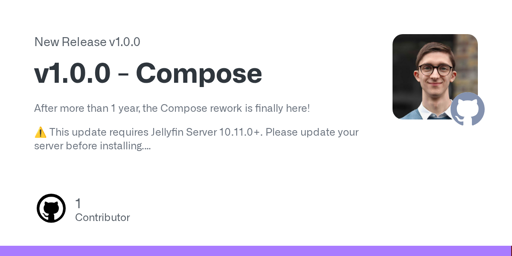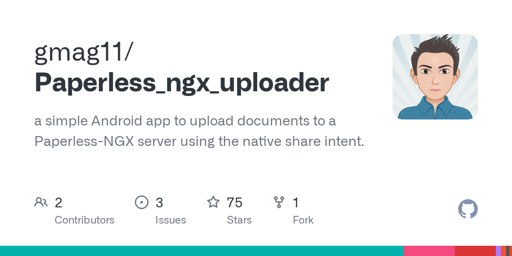- 13 Posts
- 192 Comments

 22·1 month ago
22·1 month agoDon’t trust a VPN kill switch, they can fail. Bind your torrent client to your VPN network interface.

 1·2 months ago
1·2 months agoInteresting, maybe they check whether it’s a domain/remote IP on the client side to prevent usage of a reverse proxy.

 11·2 months ago
11·2 months agodidn’t have to
Now you do have to, unless you pay for Plex and its convenience.

 21·2 months ago
21·2 months agoYou need to properly name your media with a proper scheme (including tmdbid/imdbid).

 61·2 months ago
61·2 months agoYes, after I set up the server properly (reverse proxy). With this change the same setup on the server side is necessary for remote streaming with free Plex.
My mum puts in the domain, username and password and starts streaming.

 2·2 months ago
2·2 months agoI don’t think Jellyfins focus is currently to support irregular naming schemes. Naming media correctly with a proper scheme is the way to go.
Just so you know I wouldn’t hold my breath.

 5·2 months ago
5·2 months agoYes. There’s AudioBookShelf for audio books.

 51·2 months ago
51·2 months agoRoku is also a thing in Europe.
Though I also gave up trying to set up Tailscale for people and just exposed Jellyfin (behind a reverse proxy).

 9·2 months ago
9·2 months ago“Good luck setting up remote streaming with free Plex.”
Yes, Jellyfin does not forward ports for you. Same as free Plex. With this change both are the same difficulty to set up for free, the only difference is with Plex there’s a shortcut: Buy Plex.

 131·2 months ago
131·2 months agoJellyfin does not host anything. With this change free Plex users behind a reverse proxy (or VPN) and Jellyfin users behind a reverse proxy (or VPN) work the same for remote access.
The only difference is that Plex no longer provides expensive services for free, while Jellyfin never provided them.

 3·2 months ago
3·2 months agoYes, but you should use a reverse proxy for anything open to the internet. If you use a reverse proxy (without passing X-Forwarded-…), Plex and Jellyfin should have feature parity with this change.

 11·2 months ago
11·2 months agoI personally prefer Android TV for its app support.

 85·2 months ago
85·2 months agoNon-rechargeable batteries is a terrible idea from an ecological point of view.
Most people won’t replace an internal battery. If the battery dies, they buy a new controller.
I’m not sure whether this is actually better for the environment than even if they were using non-rechargeables.

 2·2 months ago
2·2 months agoI mistakingly wrote 6600, it’s similar to a lower clocked RX 7600. Though it’s performance is not that much different than the 6600. It’s a okay GPU. It’s a entry level GPU, i.e. the most inexpensive to get while still getting good value.

 51·2 months ago
51·2 months agodeleted by creator

 3·2 months ago
3·2 months agoRoku is really simple and locked down. There’s ads on one side but nothing else. My 80yo grandma uses it.
Otherwise Projectivy is an Android TV launcher that can be configured to be really stripped down. It takes a bit of time but if you do it right it’d show less options than even Roku (it’d show only the apps you select, no launcher settings etc).
As a box I’ve heard good things about Onn (Walmart) if your in the US. If not, Homatics is great but pricey. Kick Pi KP1 is more affordable (but still way more expensive than Onn).

 6·3 months ago
6·3 months agoDisclaimer: I’m not a lawyer.
In my opinion they should be safe legally because extensions are developed and distributed separately.
But I don’t think companies like Kakao care for that. If they DMCA (or sue) Mihon devs, they’d have to de-anonymize themselves to properly fight the claim. If not, at least their website or source code repo could get taken down. If they’ve used Discord or a similar platform, chats could be used to identify them.
Ryujinx, a Nintendo Switch emulator, stopped development a year or so ago. As far as we know, it was developed cleanly without doing anything illegal. But Nintendo somehow found the developer (in Brazil I believe) and threatened them so they folded. Nintendo didn’t even need to sue them.

 13·3 months ago
13·3 months agoIt’s not even piracy. The license permits redistribution and profiting of it.
The issue is that this increases the risk of Mihon getting shut down. Mihon devs don’t make any money. Nobody profits of those downstream developers using the name of the original project to make money besides them. It’ll just result in Mihon ceasing to exist.

 5·3 months ago
5·3 months agoBetter back up your list somehow in case they go down.
Given the list is local Mihon would continue to work for the foreseeable future. The first thing to break are the extensions which doesn’t impact exporting the reading list.








The dev constantly worked on it every few weeks over the last year, but just didn’t build an official release, until they reimplemented all features.